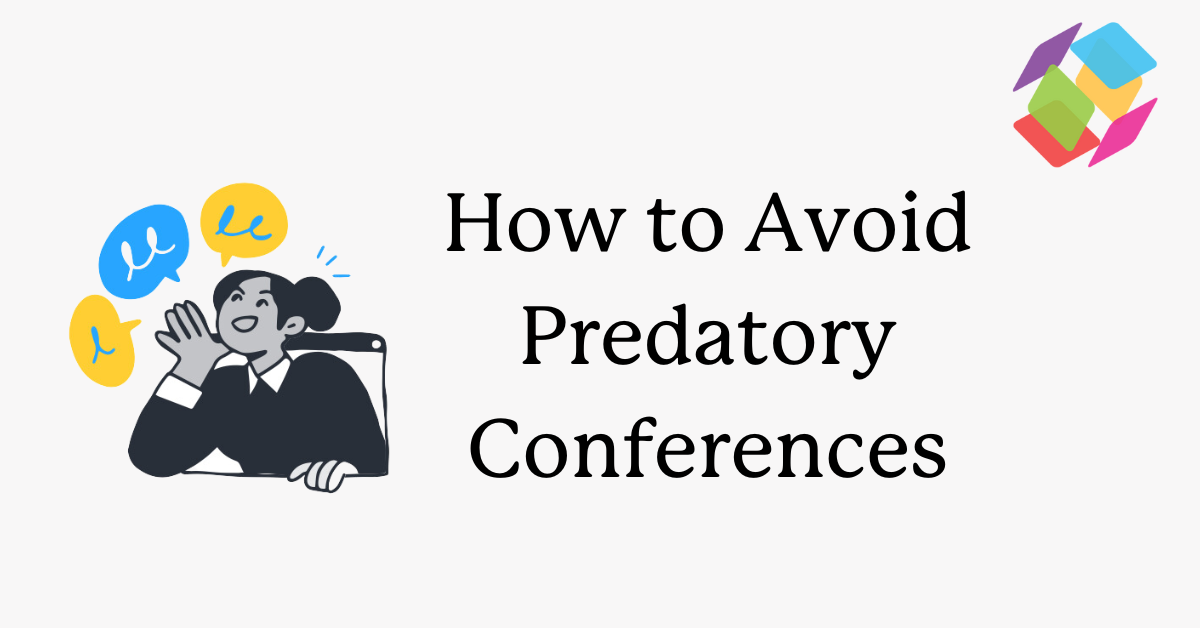How to Avoid Predatory Conferences

Once you publish a journal article or present at a conference, you might start to receive emails inviting you to attend and potentially be a featured speaker at other conferences. These conferences are often held in desirable vacation spots and cover a broad range of topics, making it easy for your research niche to fit into the theme. These invitations can be tempting, especially if you need invited status for promotion and tenure. However, some of these conferences may be predatory, existing primarily to generate profit rather than furthering research.
What is a Predatory Conference?
These conferences are almost always real events, with attendees participating either in person or virtually. What sets them apart from reputable conferences is that they are organized by groups not connected to the discipline, and their primary aim is to generate profit rather than disseminate information. In some cases, the conference may fraudulently list individuals who are not actually participating to lend the event a false sense of legitimacy.
If They are Real, What is the Problem?
These conferences often target researchers who are new to their disciplines and may not yet be familiar with the major conferences in their field. A personalized invitation, especially one promising a prominent role such as a keynote speaker, can be particularly enticing since such roles are beneficial for CVs and promotion packets. Additionally, if the conference is located in another country, it can be listed as an international conference on CVs, which carries extra weight at some academic institutions.
A common attitude towards these predatory conferences is that there is no significant harm in attending them. Some may argue that even if no one attends your talk, at least you get to travel and add a line to your CV. However, attending these conferences can have substantial costs, both financially and professionally.
The primary issue is that these conferences often require a significant financial investment, depleting valuable funds that could be better used for attending reputable events, covering publication charges, or even contributing to salary. These events are inexpensive for the organizers to run, as they often encourage attendees to stay in the conference hotel (which then provides discounts to organizers), rely on web-based conference materials, and charge high registration fees that cover meeting room and A/V expenses.
The most problematic of these conferences will falsely list well-known researchers as members of the organizing committee or as keynote speakers without their consent. This fraudulent practice can damage the reputations of these individuals and mislead other researchers into registering for the conference under false pretenses.
Red Flags to Identify Predatory Conferences
Here are some tips to identify and avoid falling victim to registering and contributing to a predatory conference:
- Check Affiliation: Verify if the conference is affiliated with a respected organization or society. Many reputable conferences are sponsored by or connected to professional organizations, which typically have a leadership board, regular events, and may also publish journals and other content.
- Examine Organizers and Speakers: Look at the names on the organizing committees or the list of featured speakers. If no names are listed, if they lack identifiable information, or if you cannot find them through an internet search, this is a major red flag. Be cautious if the individuals are retired or their research is unrelated to the conference topic.
- Consider the Conference Theme: A common warning sign is an extraordinarily broad theme covering disparate research areas that rarely hold joint conferences. Conversely, if the focus is unrelated to your research area and yet you are invited as a speaker, be suspicious. Invitation emails may also contain multiple grammatical errors and use excessive flattery to encourage you to accept the offer.
- Compare Registration Fees: Predatory conferences often have higher registration fees and charge different rates depending on the type of presentation you choose to give. For example, they may charge more for an oral presentation than for a poster or virtual presentation. This suggests that you will be assigned whatever type of presentation you request, unlike reputable conferences that peer-review submissions. Figure 1 shows registration fees where an oral presentation is more expensive than other types.

In the end, your research and experience are valuable and you deserve to present them in the most impactful venue possible. Don’t waste your time and funding on conferences that exist solely to generate profit for a company. You want to present to and be questioned by others working in your area of focus. There are many legitimate conferences to attend, so take the time to analyze before registering to avoid falling victim to a predatory one.
Additional Readings:
Chen, T. Y. (2021). PreDefense: Defending Underserved AI Students and Researchers from Predatory Conferences. Proceedings of Machine Learning Research, 142, 1–6. https://proceedings.mlr.press/v142/chen21a
Godskesen, T., Eriksson, S., Oermann, M. H., & Gabrielsson, S. (2022). Predatory conferences: a systematic scoping review. BMJ open, 12(11), e062425. https://doi.org/10.1136/bmjopen-2022-062425
Ro, C. (2024). What is it like to attend a predatory conference? Nature, 631(8022), 921–923. https://doi.org/10.1038/d41586-024-02358-w